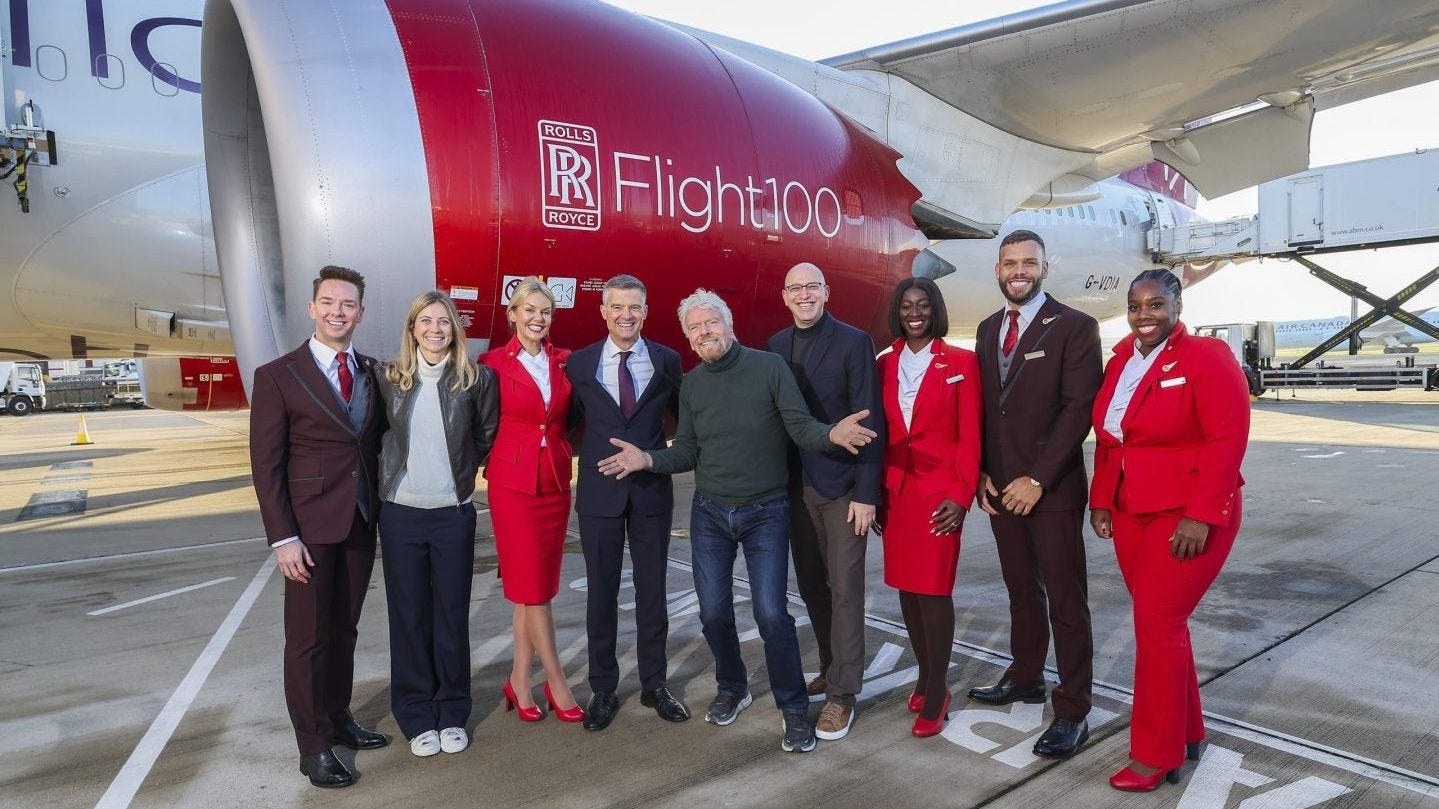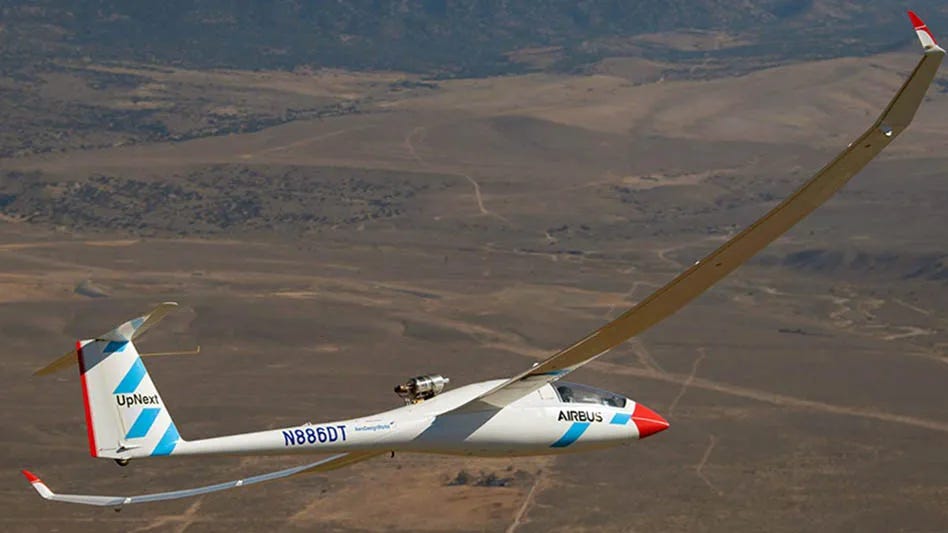#Sustainability20: Virgin Atlantic Conducts First Commercial Transatlantic Flight On 100% SAF & More
Weekly Roundup - 01/12/23
Each Friday, we publish a round-up of the 20 most important stories on sustainable aviation. You can see previous editions of #Sustainability20 here.
Industry Updates
Nations at UN-led talks agreed on an interim 2030 target for reducing emissions from international aviation by using sustainable aviation fuel (SAF), setting a 5% emissions reduction goal. China, Russia, and others expressed concerns about economic impacts.
Virgin Atlantic completed a historic transatlantic flight from London to New York using 100% SAF, marking a first for commercial airlines. This follows Gulfstream Aerospace's similar achievement last week.
American Airlines has teamed up with carbon removal startup Graphyte, supported by Breakthrough Energy Ventures, to cut its net carbon emissions. American Airlines is Graphyte's first client, confirming the purchase of 10,000 tons of permanent carbon removal, set for delivery in early 2025.
Half of the estimated 1.2 billion krones ($175 million) from the new tax will fund a transition to 100% sustainable fuels for domestic flights in Norway by 2030, with the first green-fueled route starting in 2025. The remaining revenue will go towards increasing pensions for the elderly.
The UK Government has introduced a programme worth up to £10m ($12.38m) annually, aimed at funding the aviation industry's net zero efforts. This Aerospace Technology Institute (ATI) SME Programme focuses on small and medium-sized enterprises, offering grants up to £1.5m each for innovative research projects.
Virgin Atlantic and British Airways are accused by climate charity Possible and law firm Leigh Day of misleading claims about their environmental impact, with critics arguing current cleaner flight technologies are ineffective and could lead to higher emissions or deforestation.
In January 2024, SAS will introduce EuroBonus Conscious Traveler, a reward program for EuroBonus members to make and be rewarded for sustainable travel choices throughout their journey with SAS.
Alaska Airlines, in partnership with climate-tech company Chooose, is offering customers the option to buy SAF credits or support nature-based climate projects. After booking, customers can view their travel's carbon emissions.
CLIMATE WATCH: Where the World Is (and Isn’t) Making Progress on Climate Change - The New York Times
The Rhodium Group's report forecasts global emissions to rise, particularly from heavy industries like cement and steel, potentially making them the largest source of global warming. While emissions from electricity and transportation might decrease due to renewable energy and electric vehicles, achieving zero emissions remains a challenge. The report estimates a global temperature rise of 2.8°C by 2100 and highlights the need for more aggressive climate action and technological advancements to meet net-zero targets.
Infrastructure and operational efficiencies
United Airlines, Lufthansa Group, and Deutsche Bahn have launched a joint program for integrated train and plane tickets from 25 German cities and Basel, Switzerland, to United's U.S. hubs, effective from 22 November.
Glasgow Airport, partnering with Ikigai Group and Zestec Renewable Energy, is investing £18.5m to build Scotland's largest airport-based solar farm. The 40-acre project, near Barnsford Road, will meet the energy needs of the airport and nearby businesses, with the first phase completing in summer 2024.
Pegasus Airlines has implemented the SkyBreathe eco-flying platform by OpenAirlines to cut fuel costs and CO2 emissions. This AI and Big Data-driven tool will help optimise flight efficiency and monitor fleet health, aiding in informed decision-making for pilots and maintenance teams.
Sustainable Aviation Fuel (SAF)
Airlines Race Toward a Future of Powering Their Jets With Corn - NYT
The growing demand for ethanol as SAF by US airlines could transform the Corn Belt and intensify groundwater depletion. With plans like United Airlines' deal for biofuel and the Biden administration considering tax incentives, the push for ethanol is increasing. This surge in demand raises concerns about the environmental impact, particularly on vital aquifers, as agriculture already significantly contributes to groundwater depletion in the US.
Shell and Rotterdam The Hague Airport (RTHA) have agreed to blend SAF for all aircraft at the airport from 2024, aiming for a minimum of 8% blending, exceeding the European mandate of 6% and working towards the Dutch aviation sector's 14% target by 2030.
ENOC plans to supply SAF at Dubai airports from 2024, exploring production in the UAE and abroad. The company seeks acquisitions and partnerships for global expansion and currently supplies 40% of Dubai International Airport's jet fuel.
New technology: Electric and Hydrogen
ZeroAvia completed its series C funding round, raising $116m from investors including the UK Infrastructure Bank, Airbus, Barclays, and NEOM. This funding will aid engine certification, R&D, and advancements in zero-emission aviation.
Airbus UpNext's Blue Condor, a hydrogen-powered modified glider, completed its inaugural flight on Nov. 8 in Nevada, marking the start of a test campaign for studying hydrogen contrails. The project, part of Airbus' ZEROe initiative, will compare hydrogen emissions at 30,000ft with those of kerosene, addressing aviation's climate impact. The Blue Condor team plans a contrail study in Nevada's cold weather early next year.
Electra successfully completed the first flights of its EL-2 Goldfinch, a hybrid-electric eSTOL (electric short take-off and landing) aircraft, achieving a 23-minute flight with an altitude of 3,200 feet. The Goldfinch is being developed into a nine-passenger version for commercial and government use, capable of 200 mph speeds over 500 miles. Electra holds pre-orders for over 1,700 aircraft, totalling over $6 billion.
The U.S. Export-Import Bank granted Beta Technologies a $169 million loan to expand its South Burlington electric aircraft manufacturing, supporting 400 jobs and covering some plant costs.
Air Chateau International plans to buy up to 100 Midnight eVTOL aircraft from Archer Aviation for $500 million, with a $1 million pre-delivery payment by December. The deal will expand Archer's air taxi services, initially targeting New York and Chicago in 2025 and extending to international markets like Abu Dhabi and Dubai by 2026.
Overair partners with Arlington, Texas, in a historic first for Texas, to develop and launch eVTOL operations from Arlington Municipal Airport across the Dallas-Fort Worth region. This will connect to Arlington's entertainment district, featuring Six Flags, sports franchises, and various attractions.







